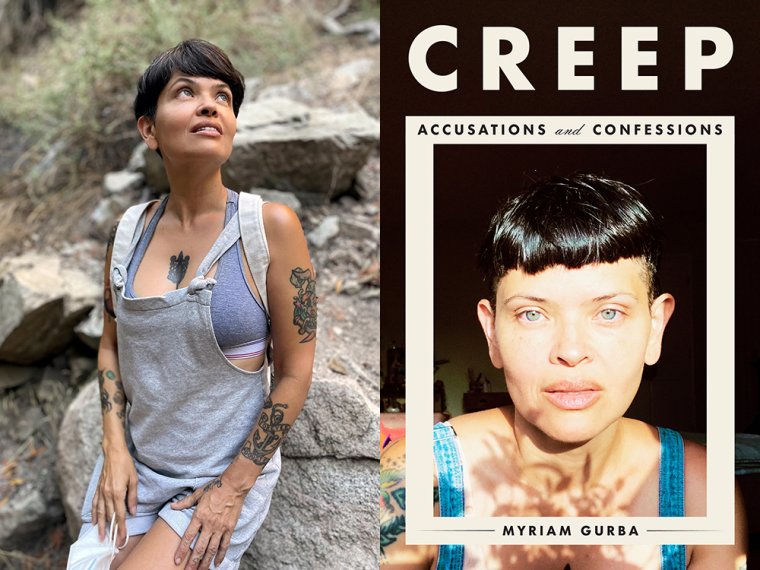This week’s installment of Ten Questions features Myriam Gurba, whose new book, Creep: Accusations and Confessions, is out today from Avid Reader Press. In these trenchant essays, Gurba weaves memoir with cultural and intersectional-feminist critique to consider the many forces of violence bearing down on women, particularly queer women of color. With an unflinching gaze, Gurba considers the “creeps” among us and the ways in which their transgressions and crimes affect individuals and the collective imagination. Gurba finds the dark thread linking all manner of bad actors, both real and apocryphal: domestic abusers, serial killers, the monsters of folk tales, and literary icons, among others. Included in the collection is Gurba’s viral takedown of the novel American Dirt (Flatiron Books, 2020)—“Pendeja, You Ain’t Steinbeck: My Bronca With Fake-Ass Social Justice Literature”—in which she lambasts the author for exploiting the suffering of Mexican migrants and the publishing industry for investing in culturally appropriative books. Publishers Weekly praises Creep: “Full of lean prose and biting commentary, this is as emotionally heavy as it is hard to put down.” Myriam Gurba is the author of the true-crime memoir Mean (Coffee House Press, 2017), the story collection Painting Their Portraits in Winter (Manic D Press, 2017), and Dahlia Season (Manic D Press, 2017), which includes stories and a novella. Her essays and criticism have appeared in the Paris Review, Time, and 4Columns.

Myriam Gurba, author of Creep: Accusations and Confessons. (Credit: Geoff Cordner)
1. How long did it take you to write Creep?
It took me about ten years to write the book. While Creep is structurally different from my memoir, Mean, Creep is Mean’s prequel and sequel. In many ways, Creep is also a book-length response to a question I’m often asked and one that never fails to irk me: Is writing about sexual violence cathartic?
2. What was the most challenging thing about writing the book?
Remembering and aestheticizing my experiences of domestic violence were the most challenging aspects of writing Creep. Revisiting that period of my life was psychologically, physically, and spiritually painful. I don’t recommend it: 0 out of 5 stars.
3. Where, when, and how often do you write?
I write at home and prefer mornings. I wrote part of Creep in bed while I was recovering from COVID-19. That felt very Frida Kahlo. I write according to an irregular schedule, so it’s hard for me to measure how frequently I write. I tend to binge-write. Sometimes I’ll sequester myself in cheap motels in rural towns and spend days writing, occasionally emerging in search of food, coffee, and other mind-altering substances.
4. What are you reading right now?
I’m reading The Other Slavery: The Uncovered Story of Indian Enslavement in America by Andrés Reséndez.
5. Which author or authors have been influential for you, in your writing of this book in particular or as a writer in general?
Tatiana de la tierra has been immensely influential. She was a brilliant, radical, beautiful, and fat friend who wrote poetry, fiction, and essays. She was also an editor, publisher, activist, librarian, pornographer, and all around magical dyke. She never shied away from using humor, and encountering the comedy in her work gave me permission to experiment with humor in my prose.
6. What is one thing that surprised you during the writing of Creep?
The strong presence of my ancestors took me by surprise. I hadn’t anticipated that they would play such a central role in so many of the essays, but they elbowed their way in and asserted themselves. Their presence makes Creep an intergenerational family memoir and history.
7. What is the earliest memory that you associate with the book?
In Creep I describe a school field trip that I took to an egg farm. My classmates and I were greeted by the unmistakable stench of chicken shit. Rural California often smells like turds.
8. If you could go back in time and talk to the earlier you, before you started Creep, what would you say?
I would strongly advise myself not to date the guy I wrote the title essay about.
9. What forms of work, other than writing, did you have to do to complete this book?
I had to heal from domestic violence. Culinary therapy helped with that. Following recipes and working with my hands soothes me. I baked a lot of pies, brewed my own corn beer, and made mountains of tortillas.
10. What’s the best piece of writing advice you’ve ever received?
Write while fully caffeinated.







